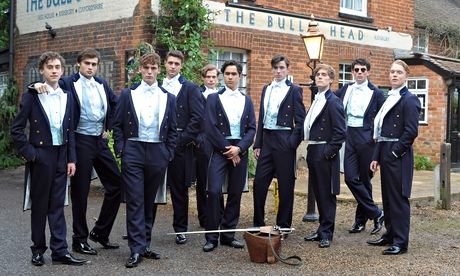
This is coming out at an unfortunate historical moment; it shows a drunken bunch of well-off Oxford undergraduates destined for Establishment greatness, smashing up a country pub whose hard-working owner is … erm … Scottish. Some years ago, David Cameron was famously discomfited when a group photo emerged, showing him strutting and preening as a member of Oxford University’s Bullingdon Club, along with the rather less embarrassable Boris Johnson. They were a tiresome collection of rowdy middle-class popinjays on grants whose forebears in this association had been satirised by Evelyn Waugh in his 1928 novel Decline and Fall as the “Bollinger Club”.
Laura Wade’s stage play Posh reinvented the Bullingdon as the Riot Club, and Wade has now rewritten it for a screen version directed by Lone Scherfig, the Dogme veteran who made An Education and One Day. Max Irons (son of Brideshead’s Jeremy “Charles Ryder” Irons) plays Miles, a posh but nice boy at Oxford, in love with Lauren (Holliday Grainger) a pretty, smart girl from a state school. But Miles is flattered when the notorious Riot Club invite him to join; these rich smoothies start teasing him about his infra-dig girlfriend and it all ends in horror at the annual debauched dinner.
It’s a sharp satirical cartoon of English class warfare and class conspiracy — though it fudges a final point of plot-jeopardy and I suspect a director like Thomas Vinterberg or Lars von Trier would have made it a hardcore nightmare. As it is, the blow is softened a bit, making this more of a picturesque Britpic.

